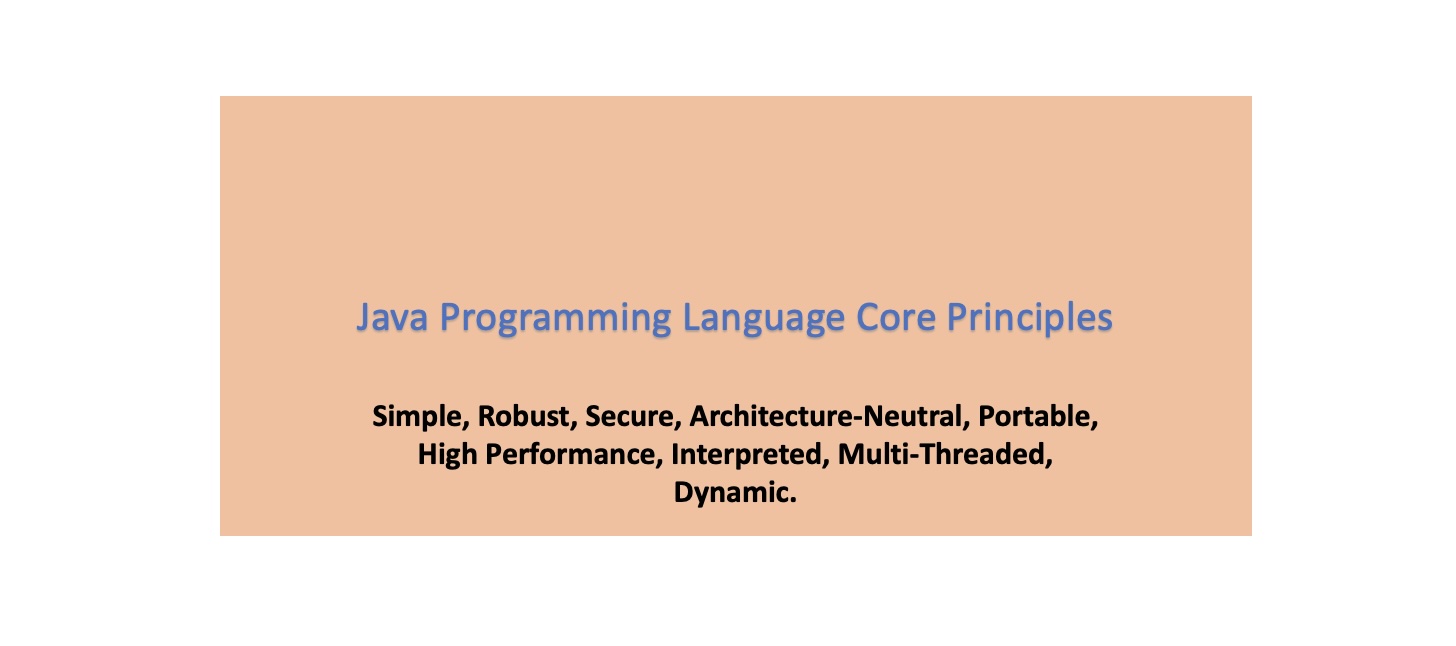If you are fresher, then the core principles of Java is one of the favorite question that an interview may start your technical interview. Below is the list of questions that you should be able to answer.
Question 1: List the core principles on which Java is based
- Simple.
- Robust.
- Secure.
- Architecture-Neutral.
- Portable.
- High Performance.
- Interpreted.
- Multi-Threaded.
- Dynamic.
Answer:
Question 2: Explain how Java is Simple?
Answer: Java has a straightforward syntax, making it easy to learn and write code efficiently. Java avoids complex features present in languages like C and C++ such as explicit pointers and operator overloading.
Question 3: What makes Java a Robust Language?
Answer: Java provides automatic memory management, this reducing the risk of memory leaks and other issues by not providing direct access to pointers.
Question 4: Explain how Java is Secure?
Answer: The Java's bytecode runs on the Java Virtual Machine (JVM) as a sandbox and implements a robust access control mechanism to protect against unauthorized access.
Question 5: Explain how Java is Architecture-Neutral?
Answer: The Java code (.java file) is compiled into bytecode, which can run on any device with a Java Virtual Machine (JVM), regardless of the underlying architecture which makes it Architecture-Neutral.
Question 6: Explain how Java is Portable?
Answer:
The Java's "Write Once, Run Anywhere" (WORA) principle allows compiled code to run on any device with a compatible JVM making it portable.
Question 7: What makes Java a high performance language?
Answer: JIT (Just-in-Time) compilation, efficient garbage collection algorithms and memory management makes java a high performance language.
Question 8: Why is Java called an Interpreted language?
Answer:
The Java code (.java file) is first compiled into an intermediate bytecode (.class file) and interpreted by the JVM at runtime for greater flexibility and adaptability.
Question 9: Explain why Java is Multi-Threaded?
Answer:
Java provides built-in support for multi-threading to efficiently handle concurrent execution, enabling parallel processing of tasks thus enhancing performance, and improving responsiveness in applications.
Question 10: What makes Java Dynamic programming language?
Answer: Java is called to be a dynamic programming language due to its support for dynamic memory allocation, allowing flexible object creation, and features like reflection that enable inspecting and modifying code at runtime.

Facing issues? Have Questions? Post them here! I am happy to answer!
Rakesh (He/Him) has over 14+ years of experience in Web and Application development. He is the author of insightful How-To articles for Code2care.
Follow him on: X
You can also reach out to him via e-mail: rakesh@code2care.org
- Get the current timestamp in Java
- Java Stream with Multiple Filters Example
- Java SE JDBC with Prepared Statement Parameterized Select Example
- Fix: UnsupportedClassVersionError: Unsupported major.minor version 63.0
- [Fix] Java Exception with Lambda - Cannot invoke because object is null
- 7 deadly java.lang.OutOfMemoryError in Java Programming
- How to Calculate the SHA Hash Value of a File in Java
- Java JDBC Connection with Database using SSL (https) URL
- How to Add/Subtract Days to the Current Date in Java
- Create Nested Directories using Java Code
- Spring Boot: JDBCTemplate BatchUpdate Update Query Example
- What is CA FE BA BE 00 00 00 3D in Java Class Bytecode
- Save Java Object as JSON file using Jackson Library
- Adding Custom ASCII Text Banner in Spring Boot Application
- [Fix] Java: Type argument cannot be of primitive type generics
- List of New Features in Java 11 (JEPs)
- Java: How to Add two Maps with example
- Java JDBC Transition Management using PreparedStatement Examples
- Understanding and Handling NullPointerException in Java: Tips and Tricks for Effective Debugging
- Steps of working with Stored Procedures using JDBCTemplate Spring Boot
- Java 8 java.util.Function and BiFunction Examples
- The Motivation Behind Generics in Java Programming
- Get Current Local Date and Time using Java 8 DateTime API
- Java: Convert Char to ASCII
- Deep Dive: Why avoid java.util.Date and Calendar Classes
- [Solved] Notepad++ Menu Bar Missing - NotepadPlusPlus
- Detect Data roaming in Android Application - Android
- How to Compare two Files in Bash Shell - Bash
- Python Hello World! Program with code example (snippet) - Python
- How to know if someone has read your WhatsApp message - WhatsApp
- How to change font, apply bold or italic styles, font size in Windows Notepad - HowTos
- Gmail Error Bad Request Your client has issued a malformed or illegal request - Google
- How to Install Python Modules in VS Code - Python